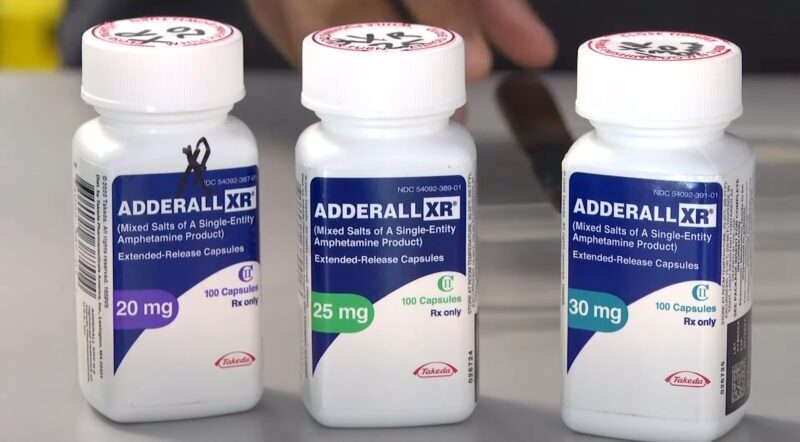Attention-Deficit/Hyperactivity Disorder (ADHD) is a neurodevelopmental disorder characterized by symptoms such as inattention, hyperactivity, and impulsivity. It affects children and adults worldwide, and its management often involves behavioral therapy and medication.
Among the medications used are stimulants like methylphenidate and amphetamines, which have been reported to affect body weight.
This article delves into the relationship between ADHD medication and weight loss, examining the underlying mechanisms, impacts, and considerations for individuals taking these medications.
Key Takeaways
- ADHD is a significant psychiatric disorder impacting life aspects like academic performance and social interactions.
- Core symptoms include inattention and hyperactivity-impulsivity, varying in severity.
- Treatment involves a combination of behavioral therapy, psychoeducation, and medication.
- Central nervous system stimulants are the most common medications for ADHD.
- These medications increase neurotransmitters like dopamine and norepinephrine, aiding in attention and reducing impulsivity.
- Common stimulant medications include Adderall (amphetamine/dextroamphetamine) and Ritalin (methylphenidate).
- The choice of medication depends on the individual’s symptoms, age, medical history, and needed duration of effect.
- Side effects like loss of appetite, insomnia, and nervousness are common with stimulant medications.
- Effective ADHD management requires a comprehensive approach, combining medication with behavioral strategies.
ADHD and Its Treatment

ADHD, a common psychiatric disorder, impacts various aspects of life, including academic achievement, social interactions, and overall functioning.
The core symptoms of inattention and hyperactivity often necessitate medical intervention. The most commonly prescribed medications are central nervous system stimulants like Adderall (amphetamine and dextroamphetamine) and Ritalin (methylphenidate).
These medications increase the levels of neurotransmitters in the brain, improving symptoms of ADHD.
Core Symptoms of ADHD:
ADHD primarily manifests in two forms of behavioral problems: inattention and hyperactivity-impulsivity. These symptoms often overlap, and their severity can vary.
- Inattention: This includes difficulty in sustaining attention, failure to follow through on tasks, disorganization, and a tendency to be easily distracted by extraneous stimuli.
- Hyperactivity-Impulsivity: Characterized by fidgeting, an inability to stay seated, excessive running or climbing, difficulty in engaging in activities quietly, and a tendency to interrupt or intrude on others.
Medical Intervention:

Due to the disruptive nature of these symptoms, medical intervention is often required. Treatment for ADHD is multifaceted, including behavioral therapy, psychoeducation, and medication.
Medication:

The most common form of medication for ADHD is central nervous system stimulants. These drugs work by increasing the levels of certain neurotransmitters in the brain, namely dopamine and norepinephrine, which help in improving concentration and reducing impulsivity and hyperactivity.
Below are tables that detail the common stimulant medications used for treating ADHD:
| Medication Name | Brand Name(s) | Active Ingredient(s) |
|---|---|---|
| Adderall | Adderall XR | Amphetamine/Dextroamphetamine |
| Ritalin | Ritalin LA, Concerta | Methylphenidate |
| Vyvanse | Lisdexamfetamine | |
| Dexedrine | Zenzedi, ProCentra | Dextroamphetamine |
| Medication | Onset of Action | Duration of Effect | Common Side Effects |
|---|---|---|---|
| Adderall | 30-60 minutes | 4-6 hours | Loss of appetite, insomnia, headache |
| Ritalin | 20-30 minutes | 3-4 hours | Nervousness, dizziness, stomachache |
| Vyvanse | 1-2 hours | Up to 14 hours | Dry mouth, weight loss, irritability |
| Dexedrine | 30-60 minutes | 4-6 hours | Difficulty sleeping, mood swings |
Considerations in Medication Choice:
The choice of medication depends on various factors, including the severity of symptoms, the patient’s age, medical history, and how long the drug’s effects last.
Some medications, like Vyvanse, offer a longer duration of action, which can be beneficial for adults or adolescents with long school or work days. Conversely, shorter-acting medications like Ritalin may be preferred for younger children to reduce potential side effects.
Mechanisms Behind Weight Changes
The link between ADHD medication and weight loss can be attributed to the way stimulants affect the body. These medications increase neurotransmitters like dopamine and norepinephrine in the brain, which can suppress appetite.
This appetite suppression is one of the most common side effects of stimulants, leading to reduced calorie intake and potentially weight loss. Additionally, stimulants can increase metabolism, further contributing to weight changes.
Evidence from Research

Several studies have investigated the impact of ADHD medication on body weight. A study published in the Journal of Child and Adolescent Psychopharmacology found that children on stimulant medication for ADHD experienced a slower rate of weight gain compared to their peers.
Another study in the journal Pediatrics noted that the degree of weight change varied among individuals, with some experiencing significant weight loss.
| Study Reference | Journal/Publication | Key Findings |
|---|---|---|
| [Study 1] Journal of Child and Adolescent Psychopharmacology | Journal of Child and Adolescent Psychopharmacology | Children on stimulant medication for ADHD showed a slower rate of weight gain compared to peers not on medication. |
| [Study 2] Pediatrics | Pediatrics | The degree of weight change due to ADHD medication varied among individuals, with some experiencing significant weight loss. |
The relationship between ADHD medication and body weight is complex, especially considering the long-term effects and the particular impact on children and adolescents. While ADHD medications are essential for managing the disorder, they come with potential side effects that need careful management.
Long-Term Weight Changes: A Varied Landscape
- Initial Weight Loss: Many individuals initially experience weight loss when starting ADHD medication, mainly due to the appetite-suppressing effects of stimulants.
- Long-Term Effects: Over time, the body’s response to these medications can change. Some individuals may experience a plateau in weight loss, and others might even see weight gain. This shift can be attributed to the body adapting to the medication or changes in eating patterns over time.
Specific Impact on Children and Adolescents
- Growth Concerns: In young patients, who are still in their growth and development phase, the weight changes can be more concerning. ADHD medication can sometimes lead to undernutrition or impaired growth.
- Monitoring and Adjustment: It’s crucial for healthcare providers to monitor the growth of children and adolescents on ADHD medication. If significant weight loss or growth delay is observed, a re-evaluation and adjustment of the treatment plan may be necessary.
Strategies for Managing Weight Changes

- Medication Management: Adjusting the dosage or schedule of ADHD medication can help minimize appetite suppression, thus managing weight loss.
- Nutritional Counseling: Consulting a dietitian or nutritionist can be beneficial. The focus should be on consuming nutrient-dense foods and maintaining a balanced diet to support overall health and growth.
- Regular Monitoring: Especially in the case of children and adolescents, regular monitoring of weight and growth metrics is essential. This allows for timely interventions and adjustments to the treatment plan, ensuring that the benefits of the medication are balanced with the overall physical well-being of the individual.
FAQs
Can ADHD medication cause weight gain in some individuals instead of weight loss?
Yes, while weight loss is a more common side effect, some individuals may experience weight gain when taking ADHD medication.
This can be due to a variety of factors including changes in metabolism, alterations in eating habits, or the body’s adaptation to the medication over time.
Are there specific types of ADHD medication more likely to cause weight loss?
Stimulant medications, such as methylphenidate (Ritalin) and amphetamines (Adderall), are more commonly associated with weight loss due to their appetite-suppressing effects. Non-stimulant ADHD medications tend to have less impact on appetite and weight.
Is the weight loss experienced on ADHD medication considered healthy?
Weight loss resulting from ADHD medication is not typically considered healthy, as it can often be a result of reduced appetite and insufficient nutrient intake. It’s important to maintain a balanced diet and healthy eating habits while on these medications.
Can switching to a different ADHD medication alleviate weight loss issues?
Yes, switching to a different medication can sometimes help manage weight loss issues. Non-stimulant ADHD medications or different formulations of stimulants may have less impact on appetite.
However, it’s important to consult with a healthcare provider before making any changes to medication.
Are there any long-term risks associated with the weight loss from ADHD medication?
Long-term risks can include nutritional deficiencies, especially in children and adolescents whose growth can be affected.
In adults, prolonged appetite suppression and weight loss can lead to unhealthy body composition changes and other health issues. Regular medical supervision is essential to mitigate these risks.
What dietary recommendations are usually given to those experiencing weight loss due to ADHD medication?
Dietary recommendations often include eating small, frequent meals throughout the day, focusing on nutrient-dense foods, and possibly using meal supplements if necessary. Consultation with a dietitian can provide personalized advice to ensure adequate nutrition while on ADHD medication.
Final Words
ADHD medication can lead to weight loss, primarily due to its appetite-suppressing effects. However, the impact varies among individuals, and long-term effects on weight can differ from initial experiences.
It is essential for individuals taking ADHD medication to work closely with healthcare providers to monitor weight and overall health. Adjustments to medication or dietary interventions may be necessary to ensure a balanced approach to managing both ADHD and weight.
In conclusion, while ADHD medications are effective in managing the symptoms of the disorder, they can have unintended effects on weight. Understanding these effects, monitoring them closely, and taking appropriate measures can help mitigate potential health risks.
As with any medication, the benefits and risks must be weighed carefully, and a personalized approach to treatment is vital for optimal health and well-being.

